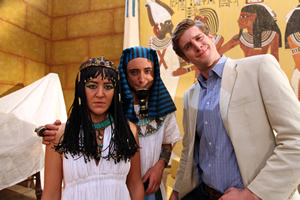Greg Jenner interview
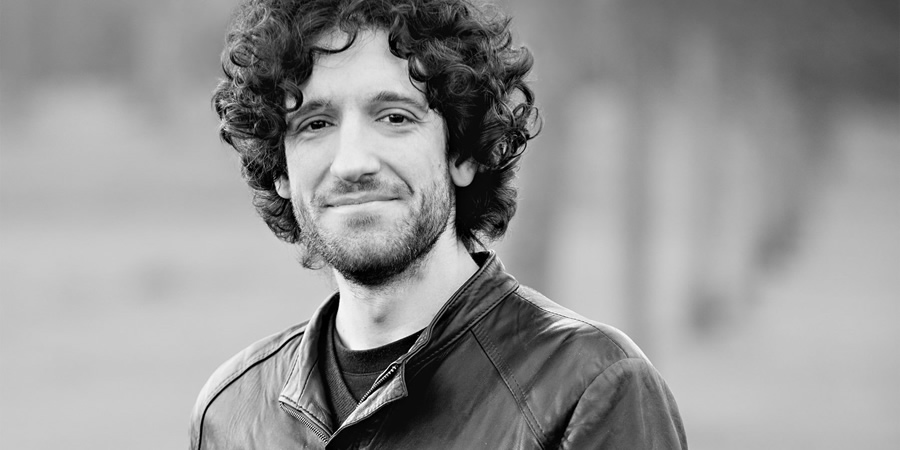
Greg Jenner is a historian and writer who acts as the 'Chief Nerd' on Horrible Histories. With the programme nominated for an Emmy, Greg took to Twitter to tell the story of how he wasn't meant to work on the show but managed to talk his way in. It sounded like a fascinating tale, so we asked to meet him so we could get the full tale.
So how are things? It sounds like you've been really busy recently.
Yes, busy is the word! I'm in a weird place career-wise as I'm sort of moving in to TV presenting [most recently BBC Two's Inside Versailles], having moved into writing books, and I still work on Horrible Histories... so I now have three jobs which are all quite different.
How did you get started with the Horrible Histories job in particular?
I was working in the TV industry making documentaries.
I'd studied at university for four years, I'd done my degree and my Masters, but couldn't afford my PhD. I was thinking 'what can I do? I want to carry on with history, I really like history, and I'd always wanted to teach it.' So I thought to myself 'how do I teach history without going into a classroom?'.
I've always loved telly and movies too, so I thought the TV industry might be interesting. I could be a sort of evil genius, like a 'proper historian' lurking amongst the TV people, trying to make history documentaries a bit better. At that time they were quite, well, not bad, but...
And this would have been when?
Around 2005. I went straight into TV after my Masters. TV documentaries at the time were watchable, but they were presented by celebrities; like you'd have Richard Hammond on D-Day. There was a culture that celebrities were the only thing that got ratings; with the exception of Simon Schama and David Starkey, who were given massive amounts of air time and very lucrative contracts. You'd have thought they were the only two historians in Britain - there are others!
I was aware that this wasn't a very helpful way to communicate history...
So you thought you'd be writing for Richard Hammond?
I feared I'd be writing for Richard Hammond! I'm sure he's a very lovely guy, and I've had friends who've worked with him who say he's very nice, but ultimately history programmes should be presented by historians, really.
So my idea was to join telly. I was very aware that I'd have to learn the ropes and understand how TV works. Obviously it's one thing to be someone who's good at history, but it's another to understand the mechanics of storytelling, the production side, logistics, the basics of narrative - all that stuff which you look at when you join the TV industry and go 'Oh God, I had no idea.' So I had to learn all that.
I was making history documentaries working for a company called Lion Television, where I'd done my work experience the first time. I overheard my boss on the phone talking about Horrible Histories. I love comedy, I wrote comedy at university and did a bit of improv. I was going to do my PhD thesis on medieval satire, so I was already interested in comedy as an intellectual thing, and growing up I had idolised Eddie Izzard, Peter Cook, Blackadder, and all those landmark shows (I'm a massive comedy nerd).
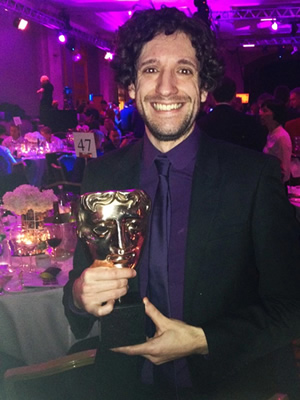
So when my boss said 'we're going to be doing a comedy show for children about history', I told him I had to work on it. I was very shy at the time and wasn't able to go "I'm the man you need to make your show great!", all I said was "please, I'd desperately love to work on your show in any way possible. I'll do the photocopying, I'll make the tea, just please let me be near this experience."
Then he invited me along to meet the producers, which was surprising. I expected him to say 'no'. And the producers were these brilliant people who are now friends and colleagues of mine, but at the time were... strangers, but not strangers, because I knew their names from TV credits, which was very scary.
The Series Producer was Caroline Norris, who is rather brilliant and had previously done Armstrong & Miller, and has since done Raised By Wolves, Newzoids, Tracey Ullman's Show... so she's massively talented. And what was great about her is she'd done children's stuff before, as well as sketch comedy for adults, and now she was going to smush these two totally different genres into sketch comedy for kids. But what she hadn't really done before was 'factual sketch comedy'.
Caroline brought on board Dominic Brigstocke to direct, and he's basically comedy royalty in terms of directing. I Googled him and the list just keeps on going. So that was terrifying. And I got his name wrong in the meeting! But thankfully he got mine wrong, so we cancelled each other out.
The third major player was Giles Pilbrow, who is a comedy machine. He's basically the Terminator if the Terminator wrote jokes. He's just relentlessly funny, clever, and works stupidly long hours just churning out comedy sketches. He'd previously produced Have I Got News For You for several years; he'd made 2DTV, which was obviously a big hit. He'd started on Spitting Image maybe when he was really young, so his comedy pedigree was just ludicrous. And he was a cartoonist, in his spare time. I don't know how he achieved that, but he did very funny cartoons for magazines and prestigious newspapers. So he was a comedy producer, a comedy script writer, a comedy script editor, a cartoonist and he could just do everything.
These three people, between them, had worked on pretty much every TV show I'd ever watched.
So what were you exactly going for at that meeting with the three of them?
I didn't know. My boss just said to them "come and meet Greg, he's good at history, and this is a history show, so do you think there's anything we can do with him?".
And I was like "Hi, I'm Greg...". And I do not remember impressing at all. I don't remember saying anything interesting. I was around 26 at that time, which is young - I'd only started in the industry aged 23, so I was junior but I had enough credits under my belt and knew what I was doing enough to not be totally terrified... but then these three people were totally huge, and then I got Dom's name wrong, so under no circumstances did I expect anything at the end, other than doing the photocopying.
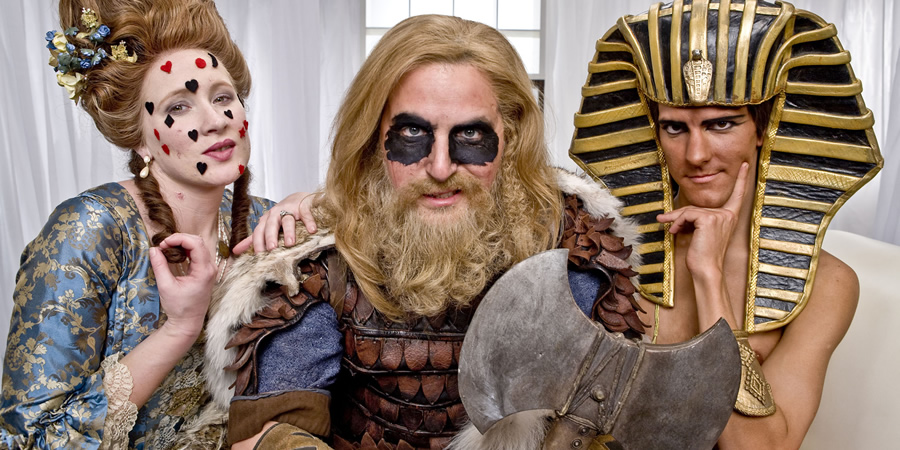
Did they put you through your paces during that meeting?
I don't think they did, but I don't really remember what that meeting was. I just remember I told them quite a lot about my background, what I'd done at uni, what I'd worked on since, and the fact that I was so into comedy; writing it, how it works, the rules (like 'the rule of three' that all the comedy writers know instinctively, or learn to know instinctively). And they seemed to see that here was someone who's clearly interested in comedy, and pretty good at history (but they didn't know how good I was because you can't exactly turn up and demand they test you - 'any name, any date in history!' That's not a game you play really).
I think I was just suitably interesting enough for them to say 'well, OK, maybe he's useful to have around'. But I didn't get that feeling in the meeting, and by the end I was just overcome by terror. Clearly I didn't cry, but I was on the verge of a crackly-voiced "well thank you, bye!" You know, the kind of meeting where you feel like an absolute fraud.
Does that feeling ever go away...?
No! No, no, no. Well, it moves and shifts. I feel like I'm quite good at Horrible Histories now, but then you write a book and think "Oh God, I'm a fraud!" all over again. That you're still a fraud, but in a different genre. And now I sort of present TV programmes and again it's a whole new feeling of fraudulence, with a lot more terror because you're on screen and people can see you and say "who's this idiot with a stupid face?". So, no, the fraud thing stays forever.
With Horrible Histories I'm more comfortable, as I've done it for 8 years, but it's still there.
But many awards later, and here you are.
And that's the weird bit I think, hindsight is a lovely thing. In hindsight everyone says 'Horrible Histories is such a great show, you must have known that when you first started!' But when it started it was a total experiment in terms of it being a brand new genre of television - factual sketch comedy did not exist, and we weren't really sure what we were doing initially.
We had some fantastic writers come in, and that was also very, very scary... because not only were there these three people I'd met who had all these credits, but in come people like Steve Punt - and I'd grown up watching Punt & Dennis - and the writing team from Have I Got News For You; the writing team from Armstrong & Miller; the writing team from Green Wing; and they're all sat there. And then there's me, and they're looking at me as if to say "well, go on then..."
So having got the job, which I did not expect, I then had to be the font of all knowledge. And that was massive amount of work; sitting in a room for four hours every week with these people who are professionally funny saying things like "tell me about the Tudors."
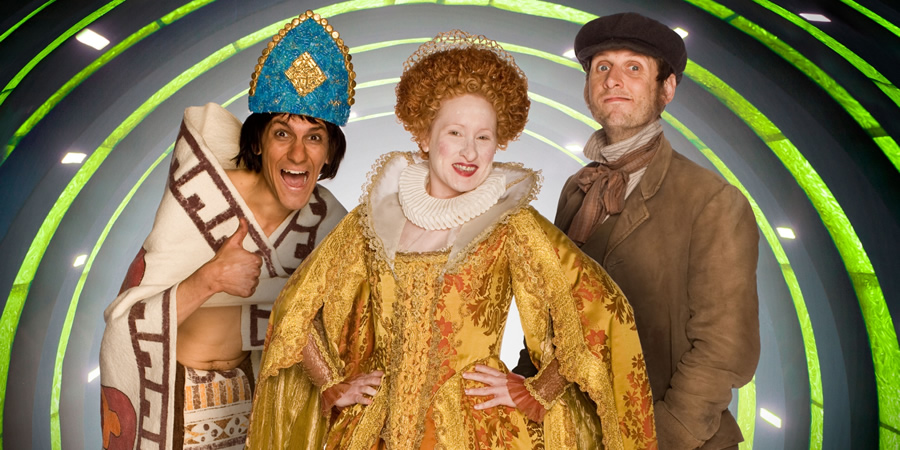
So were you giving them ideas?
Yeah, I'd go through the Terry Deary books and pick out the stuff that was funny and interesting. Caroline would do the same. And I would then supplement it with extra material, extra contextual stuff and background material on what else we needed to know about the period.
I would fact-check his facts, because he'd mostly written them in the late 90s and things had changed (and even when he wrote them, some of the facts were a bit dubious). So I went through everything in the books, fact-checked them, and if they were OK put them in a document, which was about 15-20 pages long, and then added extra material on top. And then, of course, I had to revise the subject in case the writers had any questions, which of course they did because writers are hugely annoying people with loads of questions!
I'd sit in a room with Caroline, Dominic and Giles and 12 writers; one of whom was Larry Rickard who then became a member of the cast because he is such a naturally funny man. A brilliant writer, but also a very funny comic performer.
So all these people are in the room looking at me, and I have to just tell them stuff. And from that they'd write up their sketch ideas in a paragraph - say, 'William the Conqueror exercise video'. Then Caroline, Dominic and Giles will say, "OK, does this work conceptually as a comedy sketch?". If yes, they'd commission it, and in it comes and we'd sit around all together and read all the sketches. Then I'd have to sit there and say whether each sketch was factually accurate - is it doing the job?
That's where I have huge gratitude and respect for the team because they could have easily said "We don't care about your opinion, Greg. As long as this is funny that's all that matters." But they didn't. They'd ask why it wasn't accurate, how can it be done better. How can this be as funny, or even funnier, yet truthful? Which was much harder, as it was often complicated and you have to boil that explanation down into two minutes for a seven year-old.
But that was the really exciting challenge, having grown up loving comedy to suddenly be involved in the creative process, and having to solve comic problems with solutions that had to be factually accurate. That was probably more fun than just working on the show - I got to be slightly funny (I'm not that funny... I'm funny for a historian perhaps).
So I was this weird interloper in the team, where factual sketch comedy was new and we weren't quite sure how to make it. Sketch comedy prior to that: you send in your ideas, if it's funny then they shoot it. That's how it works. Then suddenly there's this annoying guy in the corner saying "Sorry, but I'm going to have to stop you there. We can't do that because it's not true, or that's not representative of the real character of George III."
Have I Got News For You might have a libel lawyer there constantly, I was the sort of equivalent, the tedious tyrannical pedant going "Hmm, well, no..."
But the factual accuracy must have helped, because with very little work you were able to re-purpose the sketches from the kids show to the Stephen Fry Sunday night family entertainment version.
That's right! We only did one series of those, I think because a lot of people realised that a new version wasn't necessarily needed because the kids show sort of works for adults. Except for Rattus Rattus, who is quite kiddy, but even then he's quite charming for adults.
So we didn't really need Stephen Fry to appeal to older viewers though, of course, it was wonderful to work with him. I had a terrifying few days filming with him where he did literally throw random dates at me saying "what happened in this year?"
The clapper board would generate random dates by accident; say Sketch 13, Take 4, Version 3... and he'd ask what happened in 1343. He did that continuously for two days, so I had to be just on it. Thankfully I've got quite a good memory so I managed to keep up with him, but we did have a 20-minute argument about the pronunciation of a French 18th century grammarian. I'm half French so I won that argument, but it was quite a long debate.
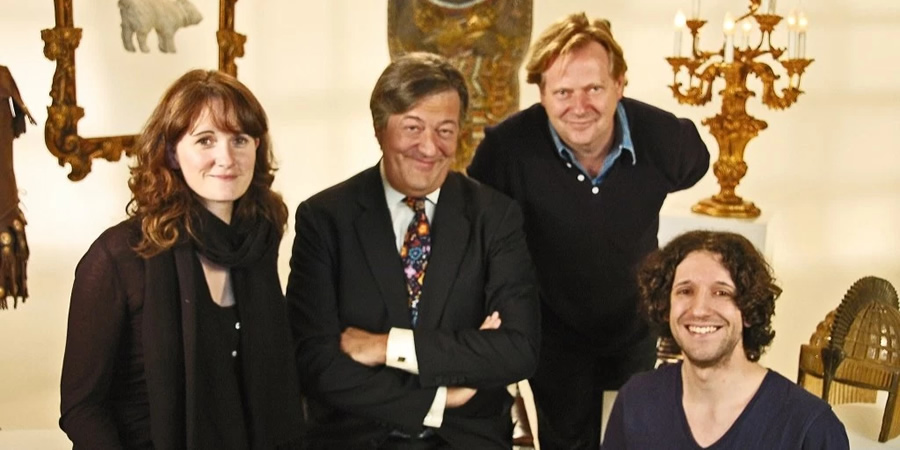
Was there a point you went "I'm 99% sure I'm right, but this IS Stephen Fry..."
Oh, all the way through, because obviously he's just a brilliant man. Anyone who's met him will tell you he's very clever, and then you meet him and think, 'wow, he really is that clever'. He's got just huge charisma and gravitas, and he's very tall so he can be really imposing, has a loud, booming voice and he's just very impressive and has an unbelievable memory. So he was just very, very convincing, so to debate with him was terrifying, with the whole crew watching. But he was a very lovely man.
We'd written all these links for him and he would just improve upon them on the spot, and just do a better joke. So that's the sort of man he is, he's everything that you expect him to be.
But that version of the show just wasn't really needed, so after Series 2 we just thought we could create a show which is very suitable for children (though the stuff in the show is incredibly violent and bizarre, it's remarkable we get away with it)... but tonally, we always throw in little jokes for mum and dad, and for the students. And, increasingly, that became the pop song parodies, where we'd do things the kids had never heard of like Adam Ant, or my favourite - which I recommended - was about the Luddites smashing up machinery in the 1800s. We did a Rage Against The Machine sort of parody, which kids would have never heard of before.
Or, indeed the Luddites, so they're learning on both fronts...
We're massively grateful to the BBC for letting us put this crazy experimental TV show on air. And not just the format, but the content is hugely provocative, and the press could have been absolutely outraged from day one, when in truth they've loved it. We've not had any major complaints which is hugely surprising. But good on the BBC for letting us do that.
I think the reason they let us is, when they got a bit nervous, we'd say "Well, Terry Deary did it in the books, and they sold over 25 million copies, so it's probably alright". One of the first sketches I wrote involved people getting their arms and legs chopped off, which you'd probably struggle to get on before 9pm on BBC One, but was OK for our kids show.
But the big thing CBBC were initially nervous about was that kids would not know many of the people in history, so we should only do sketches about the people they knew already. The problem with that approach is most kids only know about four people - Shakespeare, William The Conqueror, Churchill and Hitler. So where's the variety? And if you look at Terry's books, he doesn't do that, he's doing everything. Social history, food history, medicine, culture, clothing, and he even touches on religion (although that's something we tend to avoid in the show as it's obviously a sensitive issue for many people.)
I think the executives were very nervous that the kids would be confused and left behind if we're jumping from the Vikings (who they've never heard of), over to the Maya (who they've also never heard of). So we said that we were going to communicate all that context in the sketch; the sketch will set the premise, you'll learn about the culture, the clothes will be accurate, and we'll help kids get to grips with all these different periods, and they will then pick it up as they go along. And that argument was, thankfully, convincing enough that we were given the freedom to choose who or what would be covered. We have since proved the point really, because within a few series kids had this encyclopaedic knowledge of world history.
But the CBBC execs were right that kids couldn't be treated like an adult audience. What we did find was that kids needed the little animated characters before sketches to give them context. We couldn't crash from a Roman sketch to a Saxon sketch, as they found that very confusing, and when we did test screenings in schools for Series 1 we found that we needed more signposting, which is why we then started having a little character to pop up and say "I'm an Anglo-Saxon, and we Anglo-Saxons had weird hats" before cutting to the Anglo-Saxon sketch.
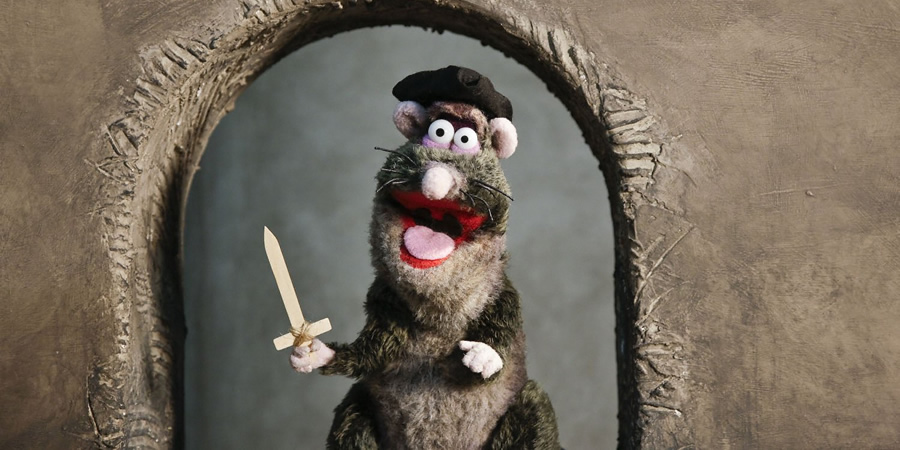
The other crucial thing was inventing the rat, who is basically (and unfortunately) me, in that he's an annoying, hairy pedant with bad jokes and terrible puns. But he's a historian, he functions as footnotes - from an epistemological point-of-view (to throw a pretentious word in), what he does is asserts and confirms, but also challenges and disavows. So he's got a little placard which comes up if something is true (or we think it's true), or one he holds up when something is silly. So he'll do a little introduction to the sketch, and might do something at the end of the sketch to say how there might be two versions of this story. So he functions as the voice of scholastic doubt. Which is a really complex thing to put in a sketch show, because sketches are just meant to make you laugh. That's another thing that made the show unique, as we'd sometimes challenge the authenticity of what you've just seen.
So we kind of nailed the concept quite early on in Series 1, but it took a lot of experimenting. A lot of the first sketches we wrote didn't quite work because they were basically Dead Ringers sketches - they were like "Historical James Bond", which was just James Bond in a ruff, but, well, they didn't have James Bond back then, it's a 20th century concept, so to do it would be misleading. That meant we had to create our own ground rules; such as no one in history could have an understanding of any period of history beyond their own. So they could be on television, provided that they were confused by the cameras. Or you could have a time-travelling journalist go back in time, or the characters could appear on Mastermind or MasterChef (anything with Master-) but they couldn't know about, say, David Beckham, or they couldn't know about George III if they were a Viking. They had to be of their period.
And then, of course, in terms of exposition you've got to have people living in that period who don't think that what they do it mad or weird, because they do it. A Roman can't ask "why are you going to the public toilet, that's so crazy" because that's what Romans do. So to introduce that concept you'd have to have either a modern journalist going back in time to ask them, or an out-of-towner who can point it out.
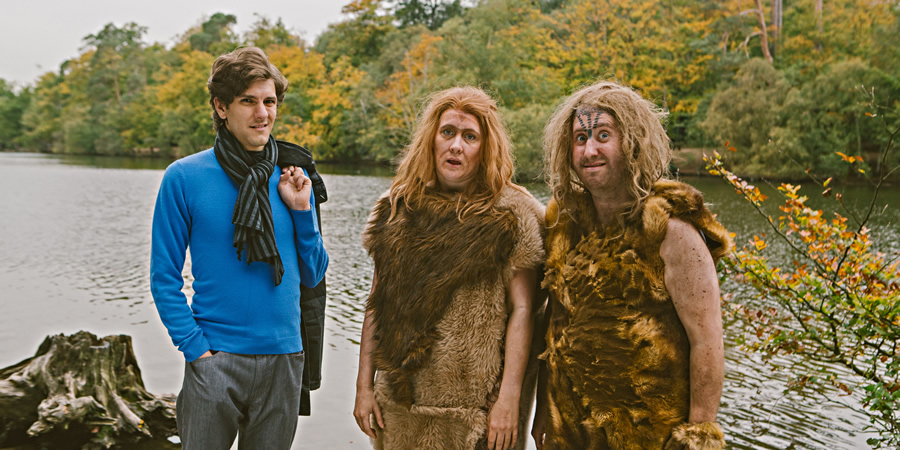
So we had to create all these little ground rules about how we try to keep these people authentic to their period, while at the same time we are a sketch show which embraces post-modern tropes - a lot of parodies, TV adverts, a lot of reality TV or movie trailers and pop songs. In many ways Horrible Histories is actually a parody of modern 21st century television, in terms of its aesthetic and structure. It's kind of mocking pop culture more than it's mocking the past. So history is the subject for the show, but the vehicle for delivering it is 21st century aesthetics.
I think this is one of the reasons it works so well, and has earnt us so many award nominations (recently our 20th Bafta nomination, and a recent Emmy nomination). The awards are really lovely to receive, but it still feels mad because I remember our challenges on Series 1 and thinking this is never going to work, it's such high concept...) but luckily we're working with incredibly clever people, and history is a very interesting subject.
The creative team was essential to the show's success. Brilliant directors, brilliant writers, brilliant producers, brilliant editors - Nigel, our editor, edited The Office - everyone on the show might not have done kids stuff before, but they'd done Bafta award-winning, internationally-acclaimed comedy. Caroline had corralled them on the basis "It'll be fun! The budgets are crazy low, but it'll be a laugh. And your kids will like it."
We had a great team of costume designers, production designers... who could just say "right, I've built you a boat!" Just everyone working at 110% of their energy levels because they love the show and it's so much fun.
It's crazy how much hard work it is, even now on Series 7 we're flying by the seat of our pants. Every day stuff goes horribly wrong because our ambition is always way beyond the modest CBBC budget, and you're literally hiring hundreds of costumes... But it always manages to turn out quite good at the end.
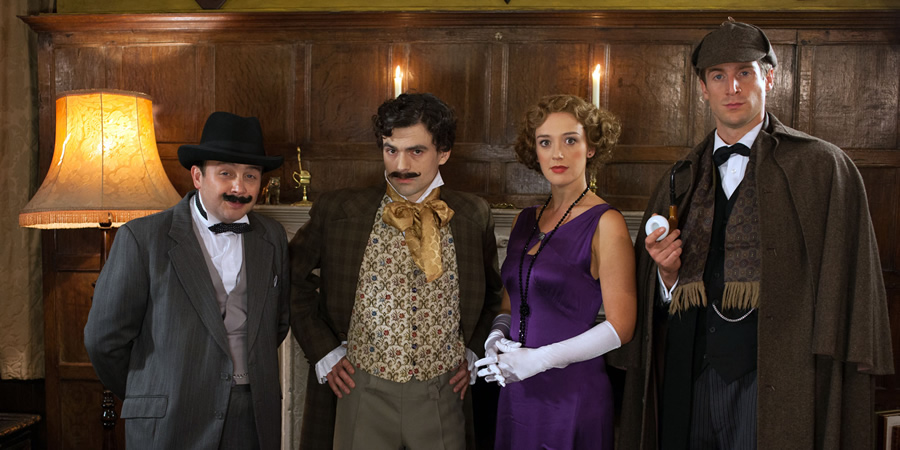
Do you get a bit more free reign because it's a kids show?
Early on, they wanted us to explain how we were going to do things, because they obviously didn't want it to be some weird laughing stock on their watch, but they were fantastic in giving us the freedom. By Series 2 they were like "you've got this, this is working, let's have some more please."
By the end of Series 5 the original cast left to go and do Yonderland and make their own movie, so I took a year off to write a book. Then the BBC decided they'd like to do some more episodes, but the original cast now wanted to do their own thing, they'd done five years of crazy hard work and were making a movie and a brilliant fantasy sitcom, so good for them. Also, Caroline, Giles and Dominic were also working on other things. That meant, if we came back, we'd have to do things a bit different.
The fantastic Tom Miller came aboard as Series Producer, and Ben Ward - who'd been on the show since day 1 - became Head Writer (as well as being the show runner on the new Danger Mouse reboot, he was a busy man!). Most of the rest of the team came back, so it wasn't too much of a changing of the guard. But we knew that this new iteration would require a superb new cast, and a structural change in approach to the history. That meant that the executives were maybe a bit more involved in what we would cover, resulting in a biographical structure on Series 6 where we covered the life and times of famous people from history rather than the scattergun approach of old. We also adopted thematic approaches in the three specials we did last year - Shakespeare, Storytelling, and The Great Fire of London.
Now we're doing Series 7, and the BBC execs are more involved in the choice of episodes, because we're doing more thematic stuff. Series 6 we did biographies - so Mary Queen of Scots, Winston Churchill - whereas Series 7 we're doing themes, so the history of art, the history of music and so on.
I think the BBC are trying to get something specific out of it, and I think they're trying to tie it up to the curriculum a bit more, make it a bit more educational as I think CBBC's remit has tweaked slightly, probably for good reasons, to help kids get on at school and enjoy the subjects. So while they still do plenty of knock-about silly stuff, I think they realised that Horrible Histories could be really good at delivering information and helping kids with their homework... while still being silly and knock-about.
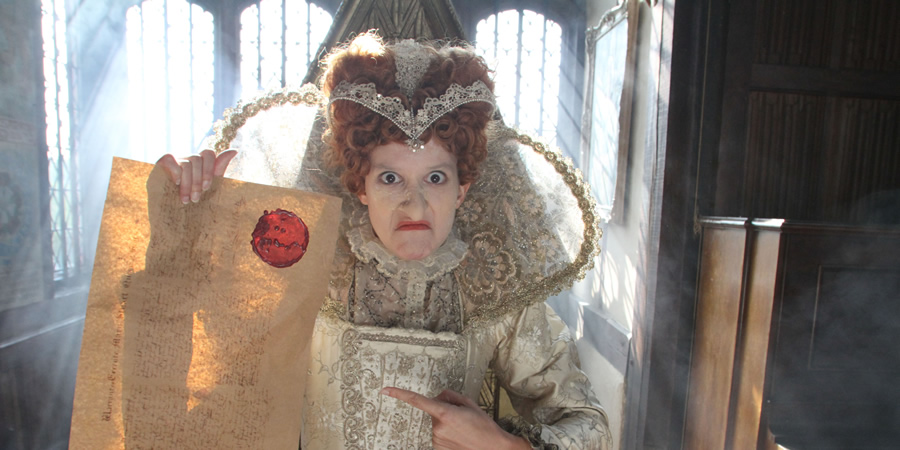
Next year we're doing a special on the Russian Revolution, because it's the anniversary of 1917, so there's the effort to keep it relevant, but that's also tricky because in the past we could just pick the most interesting or funny stories in history. My job was just to find mad history; so you have to just read 200 books a year, reading magazines, listening to Radio 4 documentaries, speaking to expert historians just looking for anything interesting, funny, weird or different. After 5 series there felt like there's not enough weird stuff left. By choosing to do thematic stuff, you can focus on a person's life, so it's easier to research.
So the Magna Carta episode that was nominated for the Emmy was a bit easier to research because you just read five books on King John and Magna Carta, speak to a couple of experts, then look at some stuff that was happening around the world at the same time (so we did Genghis Khan, a bit of India and so on). Fill in the blanks with a little bit about what the food was like, what the medicine was like and then you've got an episode.
The problem with this approach though is that, when you make a sketch, it's got to be funny, because you can't drop it. You can't drop the sketch about Magna Carta being important, because it's the whole essence of the episode... so it has to be good. Whereas before we would write 240 sketches, shoot 200 of them, and put 180 of the best ones out.
So yeah, more Channel involvement recently to bump up our educational impact. But it's still the same show at heart, plus the new cast is brilliant, they're really funny and gelling as a unit. The original cast, you could see on Series 1 that they were strangers, and gradually throughout the sketches they were getting closer and closer as friends. And by Series 2 you just see their enormous chemistry and they're just having fun because they're mates now having the best time just making each other laugh. And that's what they're like, they're brilliant comedy performers, they're lovely people, and they're best friends, so they love working together, they love acting together and for us that was an absolute godsend. And it was pure luck. I remember the auditions with the people coming in, seeing their tapes... I remember seeing Jim Howick's tape, Mat Baynton and Ben Willbond's tapes and just thinking "well you've got to have those guys, they're fantastic!".
But the casting isn't so clear cut - when you're building a team you've got to have people with different skill-sets, different looks and loads of different options, as it's a sketch show. You need human variety. So they managed to build this perfect team which was just fantastic, and included Larry who started out as one of our writers who we knew just had to be in it as well.
Whenever Larry wrote a sketch it would always end with someone getting covered in poo, and he'd always be that person, to the point where he started writing sketches saying "A man walks in who looks nothing like Larry Rickard covered in poo" which we'd always change to "a man walks in who looks exactly like Larry Rickard... covered in poo". So there was a joy to having one of the writers in the cast too. And of course they're all so funny and can improvise and bounce off each other.
So that was a wonderful thing, and now we've got the new cast who have done a similar thing, they're done two series together and have already got their own shorthands, and in-jokes, so it's really exciting to see them just getting funnier with each other.
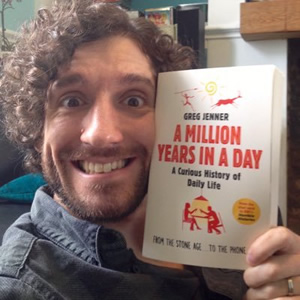
You said you wrote a book, was that something you were planning to do then or did it come as a happy surprise?
When Horrible Histories ended I just asked myself what I wanted to do - I didn't want to go back to making history documentaries, and I didn't want to be a TV presenter yet. Basically Horrible Histories is very tiring, and when it ended I was tired and run down, so I thought what could I do next? So I thought I'd write a book, I'd got a little bit of cache from the show as the nerd, so I got an agent and got a two book deal.
But then they decided to bring back Horrible Histories, so they phoned me up and asked me if I could juggle it, and I said "yeah, but part time or I'll probably die..." So I'm part time now, I have a team of researchers, and interns. I teach at Royal Holloway and York University a bit. I studied at York, so I have Masters interns who come and help us a little bit, which is really nice; bringing in the next generation of history nerds.
So now I'm writing the second book, balancing the TV, and finally sort of getting into TV presenting.
Can you tell us what the next book is about?
It's on the history of celebrity, which should be really interesting. And a massive amount of work. Luckily I'm only going up until 1940s, otherwise if you try and write about celebrity it's impossible to keep up with pop culture. When I wrote my first book, A Million Years In A Day, Lady Gaga was the most famous woman in the world, so I wrote a joke about her in the book. But when the book came out she was already less famous, and when it came out on paperback she was almost past it. But she was so famous. Everywhere she went she had daily paparazzi. And that's so interesting to me, how the lifespan of celebrity can just burnout overnight.
So you have to be careful writing a book about celebrity and not write about celebs now, as it takes about a year and a half to publish a book and you might have a situation where people are like, "Justin who? Blieber? Never heard of Justin Blieber!"
By stopping in the 1940s I'm hoping to find the roots of celebrity culture that underpin how modern celebrity works. It's the birth of Hollywood, and magazine journalism, tabloid gossip, and very early television that set up the structures which create modern celebrity. And, seeing as how I'm starting in Ancient Greece, that's quite a lot already. But hopefully people will see the parallels with modern day celebs. For example, I've been reading recently about actors in the 18th century who had bitter rivalries, and you just think 'well this is like Katy Perry and Taylor Swift - they've got their allies and their enemies, they write newspaper gossip headlines, try and scupper each other's performances and so on.'
And there were Boston riots. A famous actor of the day refused to take to the stage because the crowd wasn't big enough (which Kanye West has done) and there was a riot. And when he went back the following year there was another riot. They literally bought tickets just to come back and riot. He also cheated on his wife and there was a legal case, as he was caught out. So 2000 people went down to the theatre to just boo him for 2 hours. So the Justin Bieber thing recently about fans screaming, there were 18th century actors who were so famous or so hated that they literally couldn't get through a performance, people just couldn't hear them talk over the noise. So pretty much everything you can think of there's a precedent somewhere in history. And that's why I do what I do.
Horrible Histories Series 7 will be on TV in 2017. You can find out more about Greg and order his books via gregjenner.com

